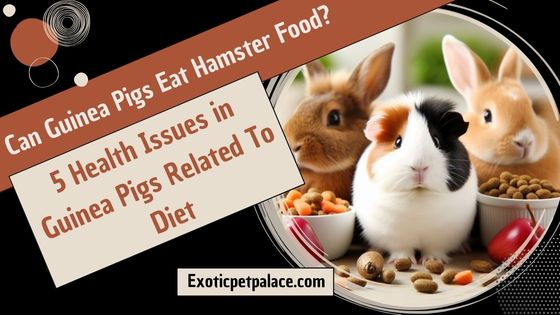With their adorable squeaks and fluffy bodies, Guinea pigs have become popular companion animals.
But unlike their rodent friends, hamsters, guinea pigs have specific dietary needs that must be met to keep them healthy and happy.
One common question among new guinea pig owners is: “Can guinea pigs eat hamster food?”
The answer is a resounding no.
Here’s a deep dive into why hamster food is unsuitable for guinea pigs.
In this article we will discuss in detail:
Why Guinea Pigs Cannot Eat Hamster Food, what constitutes a healthy diet for these charming creatures, and how to identify potential health issues.
Let’s start,
Also Read:
Can Guinea Pigs Eat Rabbit Food?|Complete Guide|
Can Guinea Pigs Eat Hamster Food?
Hamster food is not suitable for guinea pigs because it does not meet their nutritional needs and may contain ingredients that could be harmful to them.
It’s best to avoid feeding hamster food to guinea pigs and instead provide them with a diet that is specifically tailored to their needs.
So, it is clear that Guinea pigs cannot eat hamster food. But it is also important to learn why hamster food is unsuitable for guinea pigs.
Let’s Learn.
Why Guinea Pigs Cannot Eat Hamster Food?
Guinea pigs and hamsters, both rodents, have different feeding requirements due to their physiological differences.
Guinea pigs are herbivores and require a diet consisting of hay, fresh vegetables, and pellets designed particularly for them.
Hamsters are omnivores and may consume a more diversified diet, including grains, nuts, and even animal protein.
Therefore, Hamster food is not suitable for guinea pigs because it does not meet their nutritional needs and may contain ingredients that could be harmful to them.
Guinea pigs, for example, cannot synthesise vitamin C and must get it from their diet, which hamster chow may not provide in appropriate amounts.
Furthermore, the balance of fiber and other nutrients in a hamster diet is not suitable for guinea pigs.
Here’s the summary of why hamster food isn’t the right choice for your guinea pig:
Nutritional Imbalance:
Hamster food is often formulated with a higher fat and sugar content to cater to the more omnivorous tendencies of hamsters.
This can lead to obesity, diabetes, and other health problems in guinea pigs, who are strictly herbivores requiring a diet rich in fiber.
Vitamin C Deficiency:
Unlike humans and guinea pigs, hamsters can synthesize their own vitamin C.
However, guinea pigs are dependent on a dietary source of vitamin C to prevent a potentially fatal condition called scurvy.
Unfortunately, hamster food typically lacks sufficient, if any, vitamin C.
Inappropriate Ingredients:
Seeds, nuts, and dried fruits, commonly found in hamster food, pose a choking hazard for guinea pigs, especially younger ones.
Additionally, these ingredients can disrupt the delicate balance of their digestive system.
I hope now it is clear Why Guinea Pigs Cannot Eat Hamster Food?
Let’s learn what vegetables and fruits guinea pigs can eat.
What Vegetables Are Safe For Guinea Pigs?
Guinea pigs thrive on a diet rich in fresh vegetables, which provide essential nutrients and hydration.
Here’s a list of vegetables that are safe and beneficial for guinea pigs:
Romaine lettuce is a hydrating and nutritious green vegetable that may be consumed regularly.
Kale: Considered a superfood for guinea pigs, containing a variety of vitamins.
Cucumber: Excellent for hydration and a pleasant treat.
Coriander (Cilantro): A fragrant plant that guinea pigs may consume.
Sweet bell peppers: Colorful and high in vitamin C, which is essential for guinea pigs.
Asparagus: Low in sugar, high in vitamins and minerals.
Basil: Provides vitamin C, but should be used in moderation because of the calcium level.
Beets: Although all portions of the beet plant are edible, they should be served as a treat owing to their high calcium content.
Broccoli: Can be included in their regular diet in small amounts.
Cabbage: Both red and green types are beneficial, but should be fed 2-3 times a week.
Important Note: Always introduce new veggies slowly and keep an eye out for indications of stomach discomfort, such as diarrhea or bloating.
What Vegetables Should I Avoid Feeding My Guinea Pig?
When it comes to feeding your guinea pig, it’s critical to understand which veggies to avoid to preserve their health and well-being.
The following vegetables and plant components should not be fed to your guinea pigs:
Avocados: They are rich in fat and can be harmful.
Cabbage: It can cause bloating. (Should feed only 2 to 3 times a week)
Leeks: These can irritate their digestive system.
Onions: It is very toxic to guinea pigs.
Potatoes (including sweet potatoes): Starchy and can cause digestive upset.
Rhubarb: Toxic to guinea pigs.
Spinach (in large quantities): High in oxalic acid, which can interfere with calcium absorption.
Tomatoes (leaves and unripe fruit): These are toxic to guinea pigs.
What Fruits Can Guinea Pigs Eat?
Guinea pigs can enjoy a variety of fruits as occasional treats.
However, it’s important to limit their fruit intake due to the high sugar content, which can lead to health issues if consumed in excess.
Here are some fruits that are safe for guinea pigs:
- Apple: Small slices (remove seeds)
- Banana: Tiny pieces (once or twice a week)
- Blueberries: A few berries (once or twice a week)
- Cantaloupe: Small piece (remove rind)
- Grapefruit: A tiny piece (once a week)
- Kiwi: Tiny piece (once a week)
- Orange: A tiny piece (once a week)
- Pear: Small slice (remove seeds)
- Strawberry: A few slices (once or twice a week)
- Melons: Including watermelon, cantaloupe, and honeydew in small pieces
- Papaya
- Peach
- Pineapple
- Plums
- Pomegranate
- Guava (1-2 times a week)
- Apricots
As we have learned about the food that guinea pigs can eat, now let’s learn about some common health issues in guinea pigs directly related to diet.
5 Health Issues in Guinea Pigs Related To Diet:
Here are some common health issues in guinea pigs directly related to diet:
1- Vitamin C Deficiency (Scurvy)
Guinea pigs can’t produce their vitamin C and require it from their diet.
Cause: Lack of sufficient vitamin C in the diet. Guinea pigs can’t synthesize their own vitamin C and require a dietary source.
Symptoms: Lethargy, weight loss, rough fur, joint pain, bleeding gums, difficulty walking.
Prevention: Provide daily fresh vegetables rich in vitamin C (bell peppers, parsley), offer vitamin C-fortified guinea pig pellets, and consider occasional vitamin C supplements with vet guidance
2- Digestive Issues:
Dietary indiscretions are a major culprit for digestive problems in guinea pigs.
Cause: Sudden dietary changes, inappropriate food (like sugary treats or fatty foods), bacterial imbalances.
Symptoms: Diarrhea, bloating, gas, loss of appetite, wet or sticky fur around the rear end.
Prevention: Introduce new foods slowly, stick to a guinea pig-appropriate diet rich in fiber (hay), and maintain clean cage hygiene. Consult your vet if digestive problems persist.
3- Obesity:
While less common, a diet high in sugary treats and processed pellets can lead to weight gain and eventually diabetes in guinea pigs.
Cause: Overconsumption of high-calorie foods like sugary treats, fatty seeds, or excessive amounts of fruits.
Symptoms: Weight gain, lethargy, difficulty grooming, breathing problems.
Prevention: Limit sugary treats and fatty foods, ensure unlimited access to hay for proper calorie balance, and provide opportunities for exercise.
4- Dental Problems:
Keeping your guinea pig’s teeth healthy is crucial since they have teeth that continuously grow throughout their lives.
Overgrown teeth can cause difficulty eating and weight loss.
Cause: Diets lacking sufficient fiber can lead to overgrown teeth. Guinea pig teeth continue to develop, and correct chewing on fibrous hay naturally wears them down.
Symptoms: Difficulty eating, drooling, weight loss.
Prevention: Offer unlimited access to good quality hay, schedule regular vet checkups for potential teeth trimming if needed.
5- Bladder Stones:
Urinary Problems Including bladder stones and urinary tract infections also directly related to diet of guinea pig.
Cause: Calcium-rich diets (such as alfalfa hay or some vegetables like kale) might increase the risk of bladder stones.
Symptoms include blood in the urine, trouble urinating, and straining to pee.
Prevention: Feed adult guinea pigs timothy hay with a decreased calcium concentration. Limit calcium-rich veggies and visit your veterinarian if you suspect bladder stones.
Remember: A balanced diet rich in hay, supplemented with guinea pig pellets and a variety of safe vegetables, is crucial for preventing these diet-related health issues in your guinea pig.
Conclusion:
Ditch the hamster food! Guinea pigs have unique dietary needs.
Keep your furry friend thriving with the right food pyramid – hay reigns supreme, veggies add variety, and pellets provide essential nutrients.
Follow the guide given in t he article for a happy, healthy guinea pig life!
If you wanna learn more about “Exotic Pets”, visit our YouTube Channel👇
FAQs
Yes, guinea pigs can eat bananas in moderation as a treat.
A small slice (think a few millimeters thick) offered once or twice a week is sufficient due to the high sugar content.
Celery is a safe vegetable for guinea pigs but should be fed in moderation.
Its high water content means it shouldn’t be a major part of their diet, but a small stalk offered occasionally provides hydration and some vitamins.
Ripe tomatoes and their seeds are safe for guinea pigs.
However, avoid the stems and leaves, as they can be irritating to their digestive system.
Stick to a small cherry tomato or a slice of a larger tomato a few times a week.
Yes, Watermelon can be a refreshing treat for your guinea pig but should be fed in moderation.
The high sugar content means a tiny piece (think a single cube) offered once or twice a week is plenty.
Be sure to remove any seeds as they can be a choking hazard.
Yes, guinea pigs may eat a tiny piece of apple (without the seeds) as a treat.
Some individuals advocate peeling the apples first, while others believe the skin contains valuable elements.
Keep an eye out for digestive disorders in your guinea pig and make any necessary adjustments.
Grapes are not recommended for guinea pigs.
Their high sugar content and potential for digestive upset make them a risky treat. Stick to the safe fruits listed above.
Guinea pigs may live for 4-8 years if they are properly cared for.
Nope, Guinea Pig’s food isn’t ideal for hamsters.
It’s lower in fat and sugar than they need, has unnecessary vitamin C for them, and might contain ingredients that upset their digestion.
Stick to their regular hamster food!
Unlike humans, guinea pigs need to constantly munch on fiber-rich food, mainly hay.
Within hours of not eating, they can experience digestive issues.
Left uneaten for 24 hours, they risk serious health problems.
Always ensure they have a constant supply of fresh hay and water.
While rabbits can nibble on some guinea pig food in a pinch, it’s not ideal.
Rabbit diets focus on hay for digestion and teeth, while guinea pig food has more pellets and less fiber.
Rabbits also make their own vitamin C, unlike guinea pigs.
Stick to a rabbit-specific diet with unlimited hay, appropriate pellets, and safe vegetables.

